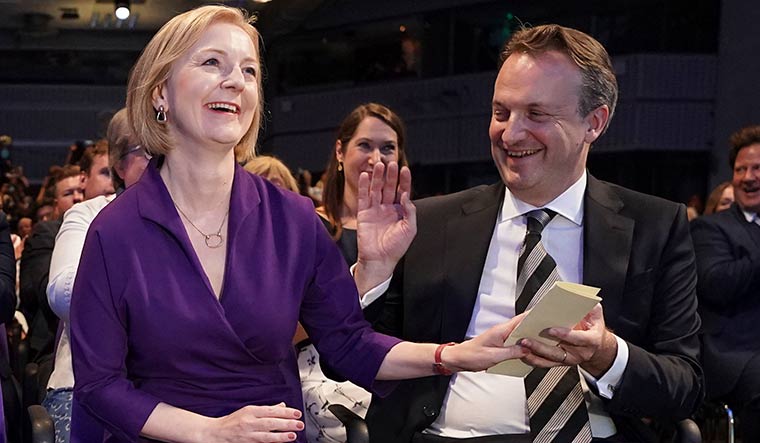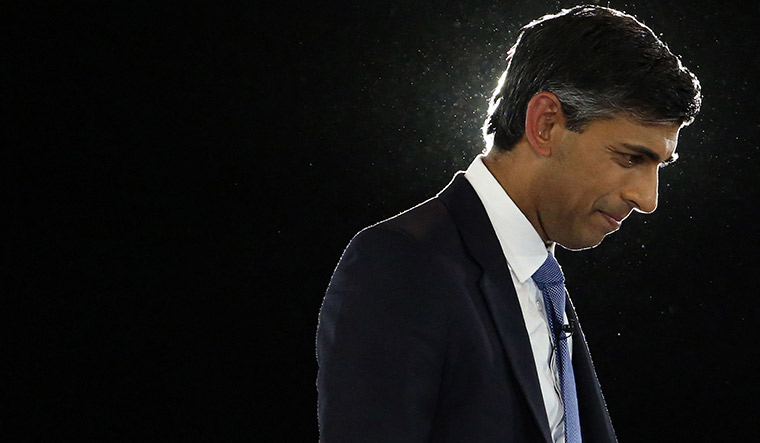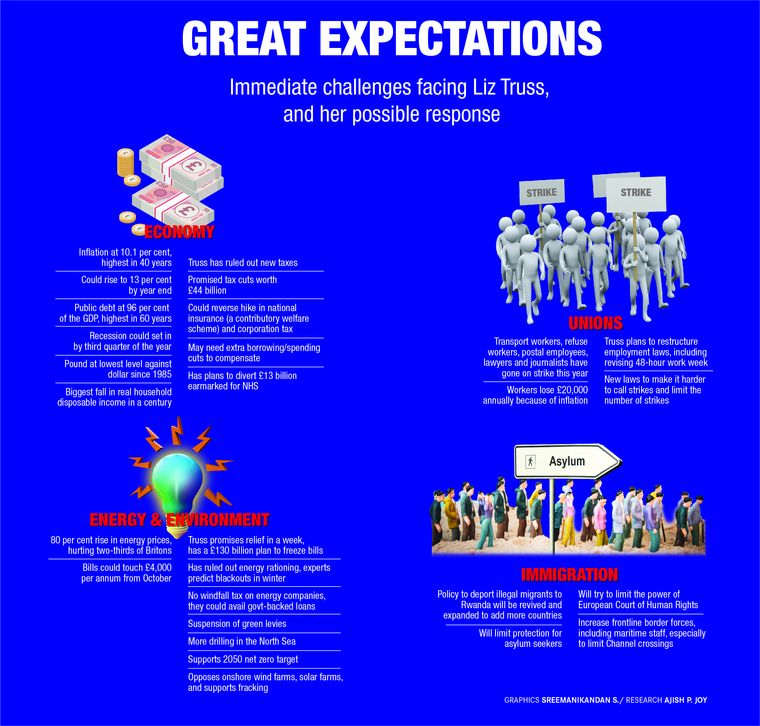So, Liz Truss it is. Britain’s new prime minister is Margaret Thatcher 2.0. That is not necessarily a compliment nor good news for 99.9 per cent of Britons. The 0.1 per cent of hard-right “selectors” who chose Truss to lead the Conservative Party and thus succeed Boris Johnson find her bracing. But the rest of Britain is bracing for tough times, if not disaster. Says political commentator Peter Oborne, “Liz Truss is terrifically out of depth. She is a dangerous joke.”
It is easy to mock Truss, but she could do more damage to Britain than Johnson ever did because of her “ideological, pro-rich, evidence-free policies”, says author and social democrat Polly Toynbee. A Truss aide quipped off the record, “What’s the difference between a Rottweiler and Liz Truss? A Rottweiler eventually lets go.”
Truss is fabled for flip-flopping and dumping policies when they do not suit her. But she is ideologically tenacious on the hard-right agenda—lowering taxes, reducing benefits, removing “green” levies, increasing military expenditure and more privatisation and deregulation. In her victory speech, Truss said, “I campaigned as a conservative and I will govern as a conservative.” These policies are not merely controversial and divisive, but destructive, as she inherits a Britain reeling under the multiple monster storms of recession, inflation, climate change, bankruptcies, shortages, strikes and cost of living crises.
Household incomes have registered their steepest fall in generations—inflation at 10.1 per cent is the highest in 40 years and is set to rise to 13 per cent by year end, according to the Bank of England. The 80 per cent rise in energy prices will soon inflate bills to around Rs4 lakh per annum, plunging two-thirds of Britain into “energy poverty” and taking winter heating from an abject necessity to a luxury of the rich. Says Juliet Sanders of Feeding Families charity, “People cannot afford to warm up, let alone cook.” Food banks are doling out meal packs of breadcrumbs and chickpeas.
Cutting welfare benefits has been compared to throwing grenades into poor households. For six million people who depend on handouts for survival, this could be the “eat or heat winter”. Old ghosts of the elderly freezing in unheated homes are exhumed once again. Political analyst Owen Jones says Truss “puts hard-right ideology above lives”.
Though Truss was voted to victory by her tiny ideology-driven base, her rise to prime ministership is legal, in accordance with Tory laws. But her legitimacy is doubtful because she did not even get a majority from her own MPs, let alone the country’s. She was the poor third choice of Tory parliamentarians whose favourite was rival candidate Rishi Sunak. However, the Tory “selectorate”—an influential, affluent, narrow base of 1,41,725, mostly English, middle-aged, male Brexiteers—has the disproportionate power to select their leader and Truss won with 81,326 votes. Says The Guardian’s associate editor Martin Kettle, “Truss will be a prime minister imposed from outside parliament. This has not happened in Britain’s parliamentary system since the unreformed era when monarchs still chose their first ministers, about 200 years ago. It will have political, and arguably also constitutional, implications.”
Truss dashed hopes of metamorphosing from a partisan campaigner for “Little England” to an inclusive prime minister of the United Kingdom. She announced her priority: tax cuts and higher spending to find a way out of recession. Truss does not explain how tax cuts and higher military budget allow this. The only route available is to borrow more money, which has been deemed reckless by experts. Public debt is now at 96 per cent of the GDP, the highest in 60 years. Economists fear that rising interest rates will make Britain’s swelling public debt unsustainable.
Truss is the trusted Tory trophy girl. But she is also a prisoner of the Brexiteers. Doggedly delivering on their agenda could take Britain on a confrontational path, domestically and internationally. Lowering taxes—which, according to many estimates, can cost more than £50 billion a year—is a red rag. Her insurance rate cut gives the poor £7.66 annually, while the rich pockets £1,801. Shrinking the National Health Service when seven million people are wait-listed for hospital treatment is a public nightmare.
A group of 40 organisations warned that Truss’s policies would damage public health, workers’ rights, food safety, welfare standards, consumer protection and the environment. “Strong protections and rules are part of Britain’s success story. They are the invisible framework that keep our society running,” says Emma Rose, director of Unchecked, one of the organisations that issued the warning. Britain’s left-right divide becomes a chasm as unions regard Truss's policies as “the old Tory campaign of privatising and transferring wealth from taxpayers to shareholders.”
Britain’s summer of discontent saw endless strikes by port, rail, telecom and postal workers who demanded higher wages to cope with higher food and fuel prices. Heathrow airport was in perpetual chaos as no-show airline staff and aircraft stranded thousands of passengers. Dustbins overflowed, and so did sewage. Francis O' Grady, general secretary of the British Trade Union Congress, said that due to inflation, workers lost £20,000 annually. “The workers are striking. They are saying enough is enough,” he said.
The summer of discontent can deteriorate into a winter of disorder. More strikes are planned unless Truss compromises. Labour unrest is reaching the ugly proportions of the inflation-ridden 1970s and 1980s. Truss’s idol, Margaret Thatcher, crushed striking workers back then, cementing her “Iron Lady” nickname. She literally starved the miners into submission, refusing to compromise as they protested for a year without pay. Finally, they returned to work without a settlement. But that was then. Now, Truss must tackle several worsening domestic crises, simultaneously and quickly.
Many Tories, however, remain hopeful. “Liz Truss is a strong character, and I think that is what we need to take our country forward," says party MP Penny Mordaunt, who was an initial frontrunner in the PM race. But taking judicious steps to solve these problems could invite Tory backbench revolts that had periodically paralysed prime ministers like David Cameron and Theresa May.
On foreign policy, Truss will be provocative and hawkish. She is likely to be hostile to Russia and suspicious of China. She risks triggering trade wars with the European Union by violating the Northern Ireland treaty that enshrines borderless trade between Britain and Ireland. That would only deepen Britain’s coming recession. But she promotes trade with commonwealth nations. Britain proudly proclaims a “special relationship” with the United States. Yet, Truss’s cocky attitude to the US seems to be, as pop star Janet Jackson sings, “What have you done for me lately?”
This conceit is a colonial hangover that Brexiteers wear like a halo. They still inhabit the Churchillian panorama of world stages, British values and global roles. Broadcaster Simon Jenkins says Truss “uses the same language of strutting interventionism… funding her imperial outreach by starving her welfare state to gouge £10 billion for defence—justifiable by no knowable threat.”
Experts fear the unmanageable and worsening domestic situation will force Truss to call an early election. The math-loving gambler thinks she could win a clear mandate and transform herself into a real Maggie Thatcher, an authentic upgrade from her current photo-op, photoshop version. But as the wizard of Oz says, “Not so fast, not so fast, my dear”.
Making Truss prime minister was a tactical move by the Brexiteers. Their true love remains Johnson. If she does not deliver on their demands, Brexiteers could mercilessly topple her and re-install their idol. Several Tory MPs are suffering from “assassins’ remorse” for ousting Johnson in the wake of his untenable string of scandals. Polls affirm that the former prime minister remains the most popular Tory vote-getter. And the BBB (Bring Back Boris) campaign has already begun.
People are relieved that the Sunak–Truss cringe contest for leadership is over. Their campaign, dubbed “the season of dark arts”, was widely seen as childish and churlish, petty and poisonous. Towards the end, party chiefs cancelled their TV debates. Former cabinet minister David Davis said this was “the dirtiest campaign” he had ever seen. Truss won, but without the landslide she expected. The hatchet is anything but buried as dark arts quiver in a season of darkness caused by blackouts. With daggers drawn, assassins prowl in parks and parliament, in private chambers and cupboards—Truss allegedly has a few skeletons, including some juicy tricks and trysts. Johnson’s parting words to Truss were, “Focus on the road ahead, but always remember to check the rear-view mirror.” That is where the backstabbers lurk. He knows. So does May. So did Thatcher.
After she made it on to the final ballot of the PM race, Truss tweeted that she would “hit the ground from day one”, carelessly omitting the word “running”. Critics call it a Freudian slip suggesting a crash-landing in office. But that is also what happens when you keep looking at the rear-view mirror. The misery of all Tory prime ministers has been their backstabbing backbenchers, not the voters or opposition parties. Truss’s story is unlikely to be any different.
A YouGov poll reveals only 12 per cent of Britons expect Truss to be a good prime minister. She begins her tenure the way Maggie Thatcher ended hers—unpopular in her own party and in the rest of the country. An old saying goes, disasters come in threes. For Britain, there was Brexit, then the pandemic and....
But she should be given the benefit of the doubt. At least for now.




